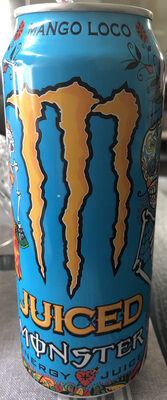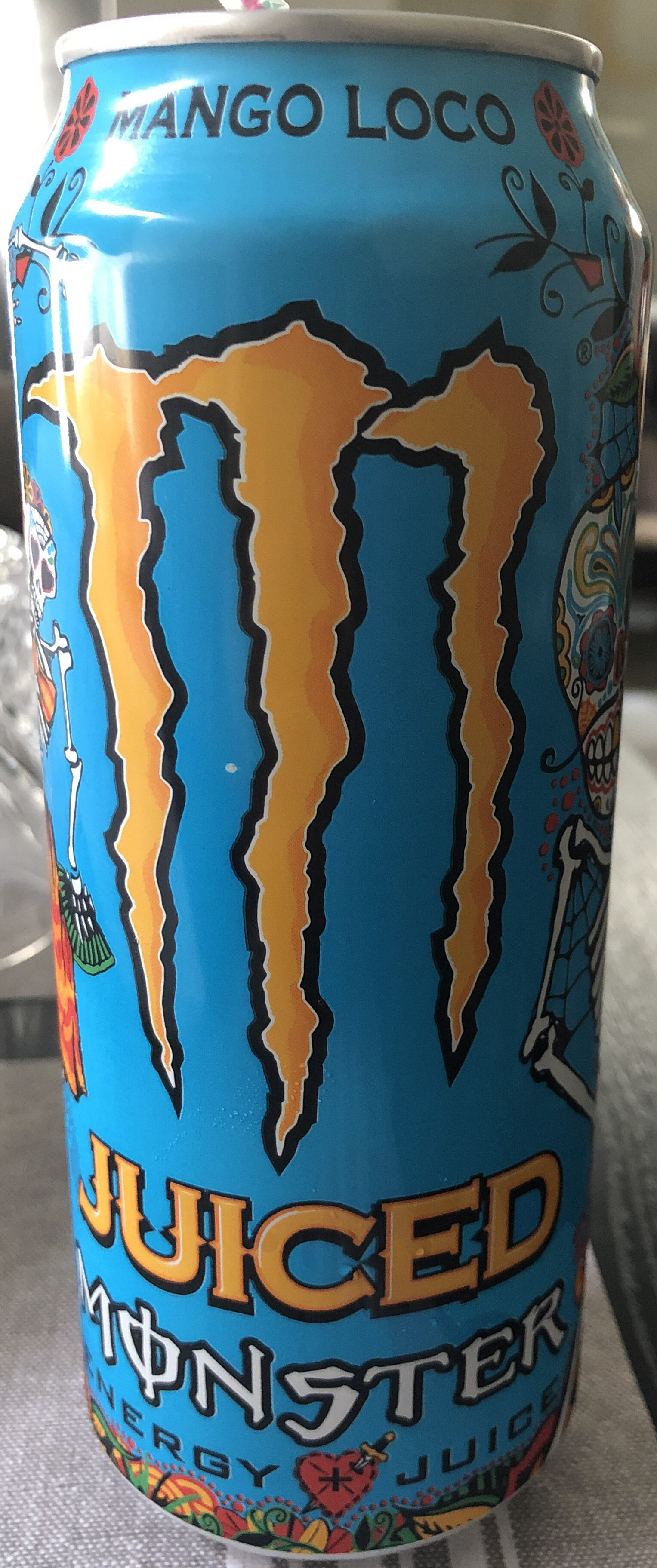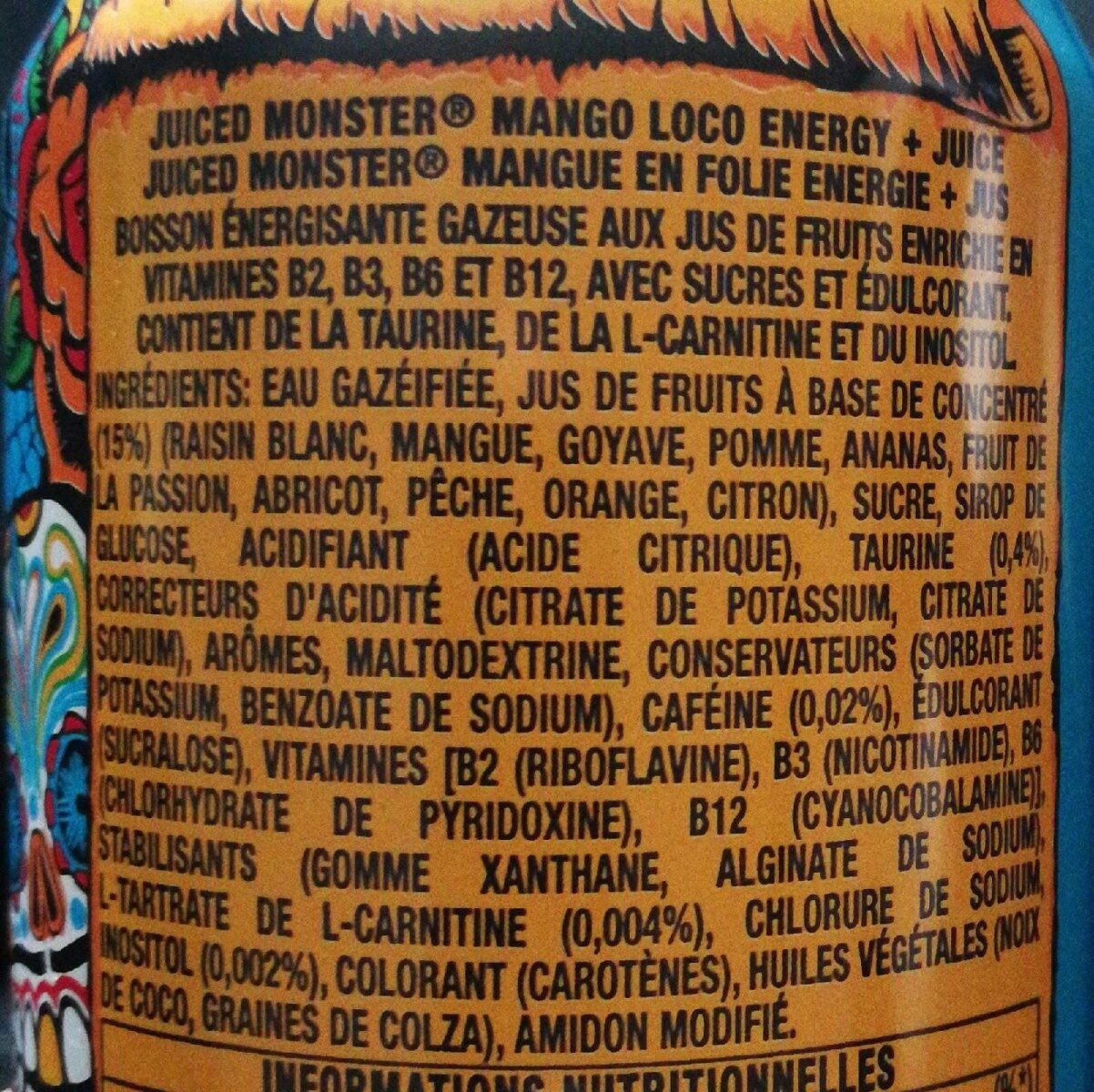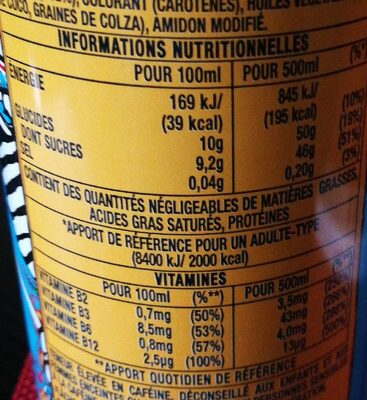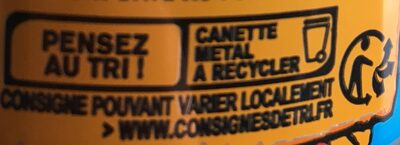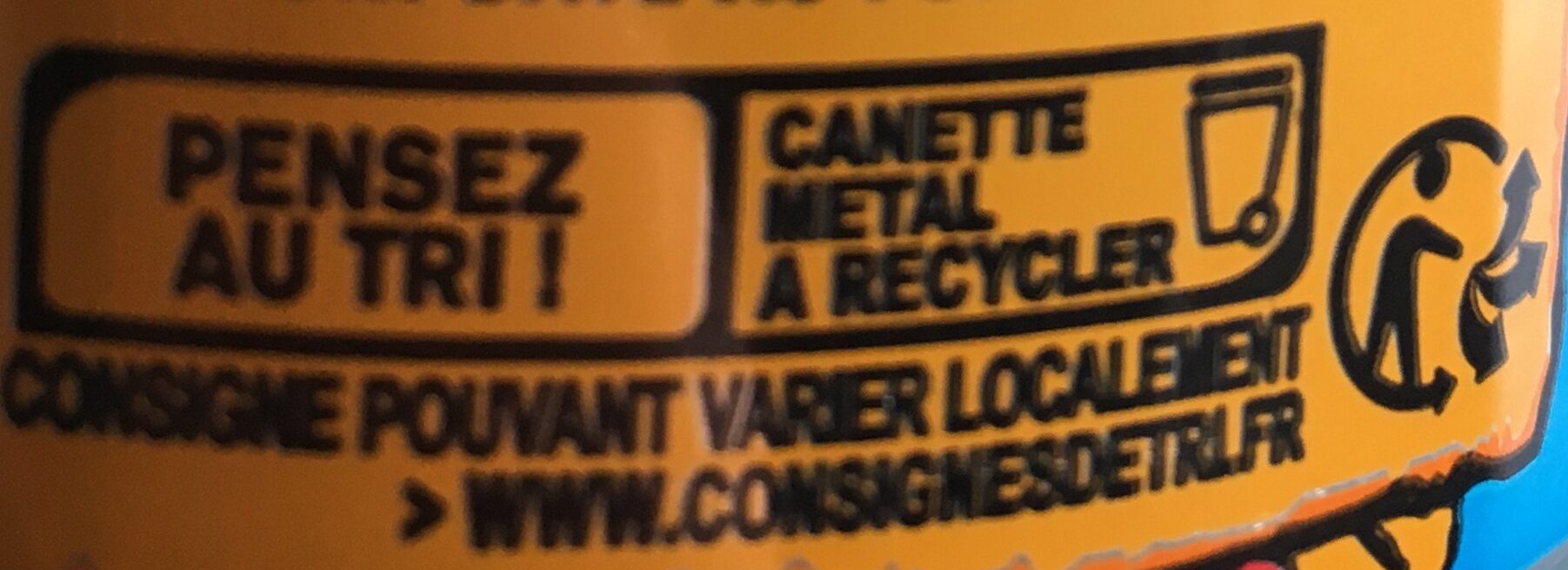Help us make food transparency the norm!
As a non-profit organization, we depend on your donations to continue informing consumers around the world about what they eat.
The food revolution starts with you!
Juiced Monster Mango Loco - 500ml
Juiced Monster Mango Loco - 500ml
This product page is not complete. You can help to complete it by editing it and adding more data from the photos we have, or by taking more photos using the app for Android or iPhone/iPad. Thank you!
×
Barcode: 5060517889852 (EAN / EAN-13)
Common name: Juiced Monster© Mango Loco
Quantity: 500ml
Packaging: fr:Canette metal
Brands: Monster
Categories: Beverages, Artificially sweetened beverages, Non-alcoholic beverages, Energy drinks, Sweetened beverages
Labels, certifications, awards:
Triman
Traceability code: 21KO8A, 321194 0721 N
Link to the product page on the official site of the producer: https://www.monsterenergy.com/products/j...
Stores: Carrefour Market, Carrefour City, Super U, Carrefour, Franprix
Countries where sold: France
Matching with your preferences
Health
Ingredients
-
49 ingredients
: Eau gazéifiée, jus de fruits à base de concentré 15% (raisin blanc, mangue, goyave, pomme, ananas, fruit de la passion, abricot, pêche, orange, citron), sucre, sirop de glucose, acidifiant (acide citrique), taurine 0,4%, correcteurs d'acidité (citrate de potassium, citrate de sodium , arômes, maltodextrine, conservateurs (sorbate de potassium, benzoate de sodium), caféine 0,02%, édulcorant (sucralose), vitamines B2 (riboflavine), vitamines B3 (nicotinamide), vitamines B6 (chlorhydrate de pyridoxine), B12 (cyanocobalamine), stabilisants (gomme xanthane, alginate de sodium), L-tartrate de L-carnitine 0,004 %, chlorure de sodium , inositol 0,002%, colorant (carotènes), huiles végétales (noix de coco, graines de colza), amidon modifiéAllergens: Orange
Food processing
-
Ultra processed foods
Elements that indicate the product is in the 4 - Ultra processed food and drink products group:
- Additive: E101 - Riboflavin
- Additive: E14XX - Modified Starch
- Additive: E160 - Carotenoids
- Additive: E401 - Sodium alginate
- Additive: E415 - Xanthan gum
- Additive: E955 - Sucralose
- Ingredient: Colour
- Ingredient: Flavouring
- Ingredient: Glucose
- Ingredient: Glucose syrup
- Ingredient: Maltodextrin
- Ingredient: Sweetener
- Ingredient: Fruit juice concentrate
Food products are classified into 4 groups according to their degree of processing:
- Unprocessed or minimally processed foods
- Processed culinary ingredients
- Processed foods
- Ultra processed foods
The determination of the group is based on the category of the product and on the ingredients it contains.
Additives
-
E101 - Riboflavin
Riboflavin: Riboflavin, also known as vitamin B2, is a vitamin found in food and used as a dietary supplement. Food sources include eggs, green vegetables, milk and other dairy product, meat, mushrooms, and almonds. Some countries require its addition to grains. As a supplement it is used to prevent and treat riboflavin deficiency and prevent migraines. It may be given by mouth or injection.It is nearly always well tolerated. Normal doses are safe during pregnancy. Riboflavin is in the vitamin B group. It is required by the body for cellular respiration.Riboflavin was discovered in 1920, isolated in 1933, and first made in 1935. It is on the World Health Organization's List of Essential Medicines, the most effective and safe medicines needed in a health system. Riboflavin is available as a generic medication and over the counter. In the United States a month of supplements costs less than 25 USD.Source: Wikipedia
-
E101i - Riboflavin
Riboflavin: Riboflavin, also known as vitamin B2, is a vitamin found in food and used as a dietary supplement. Food sources include eggs, green vegetables, milk and other dairy product, meat, mushrooms, and almonds. Some countries require its addition to grains. As a supplement it is used to prevent and treat riboflavin deficiency and prevent migraines. It may be given by mouth or injection.It is nearly always well tolerated. Normal doses are safe during pregnancy. Riboflavin is in the vitamin B group. It is required by the body for cellular respiration.Riboflavin was discovered in 1920, isolated in 1933, and first made in 1935. It is on the World Health Organization's List of Essential Medicines, the most effective and safe medicines needed in a health system. Riboflavin is available as a generic medication and over the counter. In the United States a month of supplements costs less than 25 USD.Source: Wikipedia
-
E202 - Potassium sorbate
Potassium sorbate (E202) is a synthetic food preservative commonly used to extend the shelf life of various food products.
It works by inhibiting the growth of molds, yeast, and some bacteria, preventing spoilage. When added to foods, it helps maintain their freshness and quality.
Some studies have shown that when combined with nitrites, potassium sorbate have genotoxic activity in vitro. However, potassium sorbate is generally recognized as safe (GRAS) by regulatory authorities.
-
E211 - Sodium benzoate
Sodium benzoate: Sodium benzoate is a substance which has the chemical formula NaC7H5O2. It is a widely used food preservative, with an E number of E211. It is the sodium salt of benzoic acid and exists in this form when dissolved in water. It can be produced by reacting sodium hydroxide with benzoic acid.Source: Wikipedia
-
E330 - Citric acid
Citric acid is a natural organic acid found in citrus fruits such as lemons, oranges, and limes.
It is widely used in the food industry as a flavor enhancer, acidulant, and preservative due to its tart and refreshing taste.
Citric acid is safe for consumption when used in moderation and is considered a generally recognized as safe (GRAS) food additive by regulatory agencies worldwide.
-
E331 - Sodium citrates
Sodium citrate: Sodium citrate may refer to any of the sodium salts of citrate -though most commonly the third-: Monosodium citrate Disodium citrate Trisodium citrateThe three forms of the salt are collectively known by the E number E331. Sodium citrates are used as acidity regulators in food and drinks, and also as emulsifiers for oils. They enable cheeses to melt without becoming greasy.Source: Wikipedia
-
E332 - Potassium citrates
Potassium citrate: Potassium citrate -also known as tripotassium citrate- is a potassium salt of citric acid with the molecular formula K3C6H5O7. It is a white, hygroscopic crystalline powder. It is odorless with a saline taste. It contains 38.28% potassium by mass. In the monohydrate form it is highly hygroscopic and deliquescent. As a food additive, potassium citrate is used to regulate acidity and is known as E number E332. Medicinally, it may be used to control kidney stones derived from either uric acid or cystine.Source: Wikipedia
-
E415 - Xanthan gum
Xanthan gum (E415) is a natural polysaccharide derived from fermented sugars, often used in the food industry as a thickening and stabilizing agent.
This versatile food additive enhances texture and prevents ingredient separation in a wide range of products, including salad dressings, sauces, and gluten-free baked goods.
It is considered safe for consumption even at high intake amounts.
-
E955 - Sucralose
Sucralose: Sucralose is an artificial sweetener and sugar substitute. The majority of ingested sucralose is not broken down by the body, so it is noncaloric. In the European Union, it is also known under the E number E955. It is produced by chlorination of sucrose. Sucralose is about 320 to 1‚000 times sweeter than sucrose, three times as sweet as both aspartame and acesulfame potassium, and twice as sweet as sodium saccharin. Evidence of benefit is lacking for long-term weight loss with some data supporting weight gain and heart disease risks.It is stable under heat and over a broad range of pH conditions. Therefore, it can be used in baking or in products that require a long shelf life. The commercial success of sucralose-based products stems from its favorable comparison to other low-calorie sweeteners in terms of taste, stability, and safety. Common brand names of sucralose-based sweeteners are Splenda, Zerocal, Sukrana, SucraPlus, Candys, Cukren, and Nevella. Canderel Yellow also contains sucralose, but the original Canderel and Green Canderel do not.Source: Wikipedia
Ingredients analysis
-
Palm oil free
No ingredients containing palm oil detected
Unrecognized ingredients: fr:l-tartrate-de-l-carnitineSome ingredients could not be recognized.
We need your help!
You can help us recognize more ingredients and better analyze the list of ingredients for this product and others:
- Edit this product page to correct spelling mistakes in the ingredients list, and/or to remove ingredients in other languages and sentences that are not related to the ingredients.
- Add new entries, synonyms or translations to our multilingual lists of ingredients, ingredient processing methods, and labels.
If you would like to help, join the #ingredients channel on our Slack discussion space and/or learn about ingredients analysis on our wiki. Thank you!
-
Vegan status unknown
Unrecognized ingredients: Fruit juice from concentrate, Sodium citrate, Vitamin b12, Cyanocobalamin, fr:l-tartrate-de-l-carnitine, Sodium chlorideSome ingredients could not be recognized.
We need your help!
You can help us recognize more ingredients and better analyze the list of ingredients for this product and others:
- Edit this product page to correct spelling mistakes in the ingredients list, and/or to remove ingredients in other languages and sentences that are not related to the ingredients.
- Add new entries, synonyms or translations to our multilingual lists of ingredients, ingredient processing methods, and labels.
If you would like to help, join the #ingredients channel on our Slack discussion space and/or learn about ingredients analysis on our wiki. Thank you!
-
Vegetarian status unknown
Unrecognized ingredients: Fruit juice from concentrate, Sodium citrate, Vitamin b12, Cyanocobalamin, fr:l-tartrate-de-l-carnitine, Sodium chlorideSome ingredients could not be recognized.
We need your help!
You can help us recognize more ingredients and better analyze the list of ingredients for this product and others:
- Edit this product page to correct spelling mistakes in the ingredients list, and/or to remove ingredients in other languages and sentences that are not related to the ingredients.
- Add new entries, synonyms or translations to our multilingual lists of ingredients, ingredient processing methods, and labels.
If you would like to help, join the #ingredients channel on our Slack discussion space and/or learn about ingredients analysis on our wiki. Thank you!
-
Details of the analysis of the ingredients
We need your help!
Some ingredients could not be recognized.
We need your help!
You can help us recognize more ingredients and better analyze the list of ingredients for this product and others:
- Edit this product page to correct spelling mistakes in the ingredients list, and/or to remove ingredients in other languages and sentences that are not related to the ingredients.
- Add new entries, synonyms or translations to our multilingual lists of ingredients, ingredient processing methods, and labels.
If you would like to help, join the #ingredients channel on our Slack discussion space and/or learn about ingredients analysis on our wiki. Thank you!
: Eau gazéifiée, jus de fruits à base de concentré 15% (raisin blanc, mangue, goyave, pomme, ananas, fruit de la passion, abricot, pêche, orange, citron), sucre, sirop de glucose, acidifiant (acide citrique), taurine 0.4%, correcteurs d'acidité, citrate de potassium, citrate de sodium, arômes, maltodextrine, conservateurs (sorbate de potassium, benzoate de sodium), caféine 0.02%, édulcorant (sucralose), vitamines B2 (riboflavine), vitamines B3 (nicotinamide), vitamines, vitamine B6, chlorhydrate de pyridoxine, vitamine B12 (cyanocobalamine), stabilisants (gomme xanthane, alginate de sodium), L-tartrate de L-carnitine 0.004%, chlorure de sodium, inositol 0.002%, colorant (carotènes), huiles végétales (noix de coco, de colza), amidon modifié- Eau gazéifiée -> en:carbonated-water - vegan: yes - vegetarian: yes - ciqual_food_code: 18066 - percent_min: 37.004 - percent_max: 83.22
- jus de fruits à base de concentré -> en:fruit-juice-from-concentrate - percent_min: 15 - percent: 15 - percent_max: 15
- raisin blanc -> en:white-grape - vegan: yes - vegetarian: yes - ciqual_food_code: 13044 - percent_min: 1.5 - percent_max: 15
- mangue -> en:mango - vegan: yes - vegetarian: yes - ciqual_food_code: 13025 - percent_min: 0 - percent_max: 7.5
- goyave -> en:guava - vegan: yes - vegetarian: yes - percent_min: 0 - percent_max: 5
- pomme -> en:apple - vegan: yes - vegetarian: yes - ciqual_food_code: 13050 - percent_min: 0 - percent_max: 3.75
- ananas -> en:pineapple - vegan: yes - vegetarian: yes - percent_min: 0 - percent_max: 3
- fruit de la passion -> en:passionfruit - vegan: yes - vegetarian: yes - ciqual_food_code: 13016 - percent_min: 0 - percent_max: 2.5
- abricot -> en:apricot - vegan: yes - vegetarian: yes - ciqual_food_code: 13000 - percent_min: 0 - percent_max: 2.14285714285714
- pêche -> en:peach - vegan: yes - vegetarian: yes - percent_min: 0 - percent_max: 1.875
- orange -> en:orange - vegan: yes - vegetarian: yes - ciqual_proxy_food_code: 13034 - percent_min: 0 - percent_max: 1.66666666666667
- citron -> en:lemon - vegan: yes - vegetarian: yes - ciqual_proxy_food_code: 13009 - percent_min: 0 - percent_max: 1.5
- sucre -> en:sugar - vegan: yes - vegetarian: yes - ciqual_proxy_food_code: 31016 - percent_min: 0.4 - percent_max: 15
- sirop de glucose -> en:glucose-syrup - vegan: yes - vegetarian: yes - ciqual_proxy_food_code: 31016 - percent_min: 0.4 - percent_max: 15
- acidifiant -> en:acid - percent_min: 0.4 - percent_max: 15
- acide citrique -> en:e330 - vegan: yes - vegetarian: yes - percent_min: 0.4 - percent_max: 15
- taurine -> en:taurine - vegan: maybe - vegetarian: maybe - percent_min: 0.4 - percent: 0.4 - percent_max: 0.4
- correcteurs d'acidité -> en:acidity-regulator - percent_min: 0.02 - percent_max: 0.4
- citrate de potassium -> en:e332ii - vegan: yes - vegetarian: yes - percent_min: 0.02 - percent_max: 0.4
- citrate de sodium -> en:sodium-citrate - percent_min: 0.02 - percent_max: 0.4
- arômes -> en:flavouring - vegan: maybe - vegetarian: maybe - percent_min: 0.02 - percent_max: 0.4
- maltodextrine -> en:maltodextrin - vegan: yes - vegetarian: yes - percent_min: 0.02 - percent_max: 0.4
- conservateurs -> en:preservative - percent_min: 0.02 - percent_max: 0.4
- sorbate de potassium -> en:e202 - vegan: yes - vegetarian: yes - percent_min: 0 - percent_max: 0.4
- benzoate de sodium -> en:e211 - vegan: yes - vegetarian: yes - percent_min: 0 - percent_max: 0.2
- caféine -> en:caffeine - vegan: yes - vegetarian: yes - percent_min: 0.02 - percent: 0.02 - percent_max: 0.02
- édulcorant -> en:sweetener - percent_min: 0.004 - percent_max: 0.02
- sucralose -> en:e955 - vegan: yes - vegetarian: yes - percent_min: 0 - percent_max: 0.02
- vitamines B2 -> en:e101 - vegan: maybe - vegetarian: yes - percent_min: 0.004 - percent_max: 0.02
- riboflavine -> en:e101 - vegan: maybe - vegetarian: yes - percent_min: 0 - percent_max: 0.02
- vitamines B3 -> en:e375 - vegan: maybe - vegetarian: maybe - percent_min: 0.004 - percent_max: 0.02
- nicotinamide -> en:e375 - vegan: maybe - vegetarian: maybe - percent_min: 0 - percent_max: 0.02
- vitamines -> en:vitamins - vegan: yes - vegetarian: yes - percent_min: 0.004 - percent_max: 0.02
- vitamine B6 -> en:vitamin-b6 - vegan: yes - vegetarian: yes - percent_min: 0.004 - percent_max: 0.02
- chlorhydrate de pyridoxine -> en:pyridoxine-hydrochloride - vegan: yes - vegetarian: yes - percent_min: 0.004 - percent_max: 0.02
- vitamine B12 -> en:vitamin-b12 - percent_min: 0.004 - percent_max: 0.02
- cyanocobalamine -> en:cyanocobalamin - percent_min: 0 - percent_max: 0.02
- stabilisants -> en:stabiliser - percent_min: 0.004 - percent_max: 0.02
- gomme xanthane -> en:e415 - vegan: yes - vegetarian: yes - percent_min: 0 - percent_max: 0.02
- alginate de sodium -> en:e401 - vegan: yes - vegetarian: yes - percent_min: 0 - percent_max: 0.02
- L-tartrate de L-carnitine -> fr:l-tartrate-de-l-carnitine - percent_min: 0.004 - percent: 0.004 - percent_max: 0.004
- chlorure de sodium -> en:sodium-chloride - percent_min: 0.002 - percent_max: 0.004
- inositol -> en:inositol - vegan: yes - vegetarian: yes - percent_min: 0.002 - percent: 0.002 - percent_max: 0.002
- colorant -> en:colour - percent_min: 0 - percent_max: 0.002
- carotènes -> en:e160 - vegan: maybe - vegetarian: maybe - percent_min: 0 - percent_max: 0.002
- huiles végétales -> en:vegetable-oil - vegan: yes - vegetarian: yes - from_palm_oil: maybe - percent_min: 0 - percent_max: 0.002
- noix de coco -> en:coconut - vegan: yes - vegetarian: yes - ciqual_proxy_food_code: 15006 - percent_min: 0 - percent_max: 0.002
- de colza -> en:colza-oil - vegan: yes - vegetarian: yes - from_palm_oil: no - ciqual_food_code: 17130 - percent_min: 0 - percent_max: 0.002
- amidon modifié -> en:modified-starch - vegan: yes - vegetarian: yes - ciqual_proxy_food_code: 9510 - percent_min: 0 - percent_max: 0.002
Nutrition
-
Bad nutritional quality
⚠ ️Warning: the amount of fruits, vegetables and nuts is not specified on the label, it was estimated from the list of ingredients: 15This product is considered a beverage for the calculation of the Nutri-Score.
Positive points: 0
- Proteins: 0 / 5 (value: 0, rounded value: 0)
- Fiber: 0 / 5 (value: 0, rounded value: 0)
- Fruits, vegetables, nuts, and colza/walnut/olive oils: 0 / 10 (value: 15.001, rounded value: 15)
Negative points: 21
- Energy: 10 / 10 (value: 788, rounded value: 788)
- Sugars: 10 / 10 (value: 43, rounded value: 43)
- Saturated fat: 0 / 10 (value: 0, rounded value: 0)
- Sodium: 1 / 10 (value: 120, rounded value: 120)
The points for proteins are not counted because the negative points are greater or equal to 11.
Nutritional score: (21 - 0)
Nutri-Score:
-
Nutrient levels
-
Fat in low quantity (0%)
What you need to know- A high consumption of fat, especially saturated fats, can raise cholesterol, which increases the risk of heart diseases.
Recommendation: Limit the consumption of fat and saturated fat- Choose products with lower fat and saturated fat content.
-
Saturated fat in low quantity (0%)
What you need to know- A high consumption of fat, especially saturated fats, can raise cholesterol, which increases the risk of heart diseases.
Recommendation: Limit the consumption of fat and saturated fat- Choose products with lower fat and saturated fat content.
-
Sugars in high quantity (43%)
What you need to know- A high consumption of sugar can cause weight gain and tooth decay. It also augments the risk of type 2 diabetes and cardio-vascular diseases.
Recommendation: Limit the consumption of sugar and sugary drinks- Sugary drinks (such as sodas, fruit beverages, and fruit juices and nectars) should be limited as much as possible (no more than 1 glass a day).
- Choose products with lower sugar content and reduce the consumption of products with added sugars.
-
Salt in moderate quantity (0.3%)
What you need to know- A high consumption of salt (or sodium) can cause raised blood pressure, which can increase the risk of heart disease and stroke.
- Many people who have high blood pressure do not know it, as there are often no symptoms.
- Most people consume too much salt (on average 9 to 12 grams per day), around twice the recommended maximum level of intake.
Recommendation: Limit the consumption of salt and salted food- Reduce the quantity of salt used when cooking, and don't salt again at the table.
- Limit the consumption of salty snacks and choose products with lower salt content.
-
-
Nutrition facts
Nutrition facts As sold
for 100 g / 100 mlAs sold
per serving (500ml)Compared to: Energy drinks Energy 788 kj
(185 kcal)3,940 kj
(925 kcal)+520% Fat 0 g 0 g -100% Saturated fat 0 g 0 g -100% Carbohydrates 47 g 235 g +580% Sugars 43 g 215 g +595% Fiber 0 g 0 g -100% Proteins 0 g 0 g -100% Salt 0.3 g 1.5 g +161% Vitamin B2 (Riboflavin) 3.5 mg 17.5 mg +272% Vitamin B3/PP (Niacin) 43 mg 215 mg +532% Vitamin B6 (Pyridoxin) 4 mg 20 mg +321% Vitamin B12 (cobalamin) 13 µg 65 µg -2% Fruits‚ vegetables‚ nuts and rapeseed‚ walnut and olive oils (estimate from ingredients list analysis) 15.001 % 15.001 %
Environment
-
Eco-Score not yet applicable
Not yet applicable for the category: Energy drinks
The Eco-Score is not yet applicable for this category, but we are working on adding support for it.
Packaging
-
Packaging with a medium impact
-
Packaging parts
Drink can (Metal)
-
Packaging materials
Material % Packaging weight Packaging weight per 100 g of product Metal
-
Transportation
-
Origins of ingredients
Missing origins of ingredients information
⚠ ️ The origins of the ingredients of this product are not indicated.
If they are indicated on the packaging, you can modify the product sheet and add them.
If you are the manufacturer of this product, you can send us the information with our free platform for producers.Add the origins of ingredients for this product Add the origins of ingredients for this product
Report a problem
-
Incomplete or incorrect information?
Category, labels, ingredients, allergens, nutritional information, photos etc.
If the information does not match the information on the packaging, please complete or correct it. Open Food Facts is a collaborative database, and every contribution is useful for all.
Data sources
Product added on by kiliweb
Last edit of product page on by dorado-jerome.
Product page also edited by alyx86, driveoff, ludow31, off.d6d84722-a5f6-4a5d-a07a-2c2581cfec7e, openfoodfacts-contributors, packbot, quechoisir, thaialagata, thepainofeating, yuka.SG84U0xMdzdpZHNLd2MwYjRoWHMwZXQ4NDc2a2MwZWNBT3dJSVE9PQ, yuka.sY2b0xO6T85zoF3NwEKvll5Yb4WDnz3rOD7uwEmy2tGtLMPST_1e0tbUM6s.
